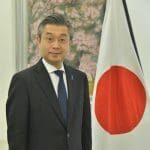Bangladesh’s Foreign Policy is now at a critical juncture in time. Choices abound, and not all are optimized for the attainment of our national priorities and strategic objectives which largely focus on strengthening regional and international economic cooperation while maintaining neutrality in the great power game whose focus has shifted significantly in the Indo-Pacific region.
Bangladesh sitting at the mouth of the Bay of Bengal has attracted regional and global players in a game of thrones where maintaining neutrality is becoming increasingly difficult.
four guiding principles of bangladesh’s foreign policy
‘Friendship to all, malice to none,’
Bangabandhu’s foreign policy dictum
Promotion of international peace, security and solidarity
Article 25 of the constitution
Trust in the UN charter
And the UN Convention on the Law of the Sea
strengthening cooperation
Both regional and international
Bangladesh has four guiding principles behind her foreign policy outlook: Bangabandhu’s foreign policy dictum ‘friendship to all, malice to none,’ Article 25 of the constitution, trust in the UN charter and the UN Convention on the Law of the Sea, and strengthening regional and international cooperation.
Caught between Great Power Game
![]()
![]()
Indo-Pacific Strategy
United States


Belt & Road Inititative
China
![]()
![]()
The Third Way
France


BIG-B Initiative
Japan


Global Gateway
European Union
Bangladesh in recent years has been drawn increasingly to a great power game between global and regional players namely the USA, China, and India. The French among Western Powers made an early bet on Bangladesh that has seemed to pay off reasonably well. The French value its strategic autonomy and have offered a “third way” in a region increasingly under the sway of China-US rivalry with their own Indo-Pacific Strategy.
“Based on democratic principles and the rule of law, in a region facing new imperialism, we want to propose a third way – with no intention to bully our partners or to lead them to an unsustainable scheme,”

Emmanuel Macron
During a state visit to Bangladesh on September, 2023.
Russia’s Manoeuvres
Investment
In the power sector
Military
Warships making port call
The Russians aren’t sitting idle as well, as they have a significant investment in the power sector of the nation. Whether it is a message that Russia is ready to roll in the wider Indo-Pacific or just a petty show of force, two Russian warships have made a port call in Chittagong recently, which marks any such development in the last 50 years. For Bangladesh, the math is quite simple. It doesn’t want to get caught up in the middle of a power game and is committed to maintaining a friendly relationship with other nations based on shared economic prosperity and respect for the ‘Rules-based order’.
India – The Next Door Neighbour
Bangladesh also doesn’t have any military ambitions other than to adequately defend and deter itself against any external threat. It has maintained parity reasonably well between two regional competitors India and China who are battling to establish their influence in the Region. With India surrounding Bangladesh from three sides with a land border of more than 4000+ kilometers, it is essentially in the best interest of Bangladesh to maintain an amicable relationship with India which has benefitted both nations.
Resolved border disputes
Land and sea border
Connectivity
Land corridors, oil pipelines, and transshipment facilities for North-east India
One could argue the merit of the level of benefits each country received but Bangladesh and India have resolved their land and sea border disputes in the International Court of Arbitration in a reasonably and exceptionally short lapse of time through which Bangladesh gained significant territory from India. It has also connected both countries through land corridors, oil pipelines, and transshipment facilities for the North-Eastern region of India, a move which also benefits landlocked Nepal and Bhutan.
Investment & L/C
To fund development projects
US$ 500 Million
Line of Credit
In return, Bangladesh has seen a greater flow of Indian investment and letters of credit to fund development projects in the transport and power sector. There is growing military cooperation between the two neighbors as Bangladesh benefits from a USD 500 million line of credit to modernize her military under the Forces Goal 2030. Bangladesh has gifted India a stable and peaceful North East which was not the case prior to 2009. The memory of a 10-truck arms haul bound for the North Eastern states of India seized in Chittagong on April 1, 2004, during the height of BNP-Jamaat rule is still fresh.
The relationship since 2009 has come a long way. This was evident when an Indian MEA official Smita Pant stated that India’s future, particularly its security, is inextricably connected with Bangladesh. For the last 15 years, Bangladesh has maintained a very delicately balanced foreign relationship with both India and its regional competitor China.
China’s Emergence
FDI | Vaccine | Military Equipment
Bangladesh’s government has developed a strong partnership with China in the last decade through economic partnership, large Chinese FDI in Bangladesh, infrastructure development as part of the Chinese Belt and Road Initiative, and vaccine diplomacy during Covid-19. Bangladesh procures a significant share of its military hardware from China. China’s non-interference in internal political affairs has increased China’s popularity at the national level of Bangladesh.
Japan – An Ever-benevolent Friend
Despite being one of the greatest beneficiaries of the India-China dichotomy, Dhaka has not been swayed away from choosing one partner over the other. It was more evident when Dhaka went forward with the Japan-funded strategically important Matarbari deep sea port over a similar proposal of their Chinese counterpart to build in Sonadia, Cox’s Bazar. One might wonder where Japan fits in these regional power games, in which case one needs to look at Japan’s Indo-Pacific strategy where India stands as a key strategic partner. Japanese Prime Minister Fumio Kishida during his visit to India in March 2023 talked about the development of a Bay of Bengal-Northeast India industrial value chain in cooperation with India and Bangladesh. This highlights the strategic importance of the port.
“What Prime Minister [Fumio] Kishida wants to achieve is to have more synergy between what Japan is doing in terms of development cooperation in northeast India and what Japan is doing in Bangladesh and harness the Matarbari deep seaport to create a new industrial value chain”

Hiroshi Suzuki
Japanese Ambassador to India
This move by Dhaka to partner with Japan, a QUAD member and one of the United States’ strategic allies in the Indo-Pacific, gave a convincing message that Dhaka is not under China’s belt. Japan is one of Bangladesh’s key development partners. Prime Minister Sheikh Hasina and Japanese PM Fumio Kishida in a joint statement during the former’s official visit to Japan in 2023 elevated Bangladesh and Japan bilateral relations to a “Strategic Partnership” from the existing “Comprehensive Partnership”.
Bangladesh has defense cooperation with Japan under which Bangladesh receives security assistance to modernize its military. So, in a way, Bangladesh’s decision to scrap Sonadia deep sea port and move forward with Matarbari which is a part of Japan’s BIG-B initiative, whether it was a voluntary decision or taken under pressure from India and the USA as some analysts point out should clear the doubt where Dhaka stands.
European Union – A Long-standing Friend
Dhaka believes that to develop a strong relationship with her, one has to respect her history, her economic and development aspirations, security concerns, and non-interference in her domestic matters. Both China and India understand this and thus have been able to grow the relationship significantly along with the European Union, notably France as is evident from the President Macron’s visit to Bangladesh where both countries have committed to take the relationship to a strategic level. As stated in President Macron’s latest letter to the Prime minister of Bangladesh.
“In an international environment characterized by multiple crises and a blatant questioning of the principles on which international law is based, we must, more than ever, deepen our partnership and thus contribute to strengthening your strategic autonomy.”

Emmanuel Macron
In his latest letter to Sheikh Hasina
United States – A Complex Partner
Washington for a very long time has looked at Bangladesh through the lens of India which has benefitted the PM Hasina-led administration. However, an unprecedented rise of China as a global power and its coercive activities in the South China Sea have forced it to be actively involved in this region. As the Russia-Ukraine conflict has become a stalemate and Russia is largely pinned down in the Donbas region of Ukraine it can now focus on China proactively. It wants to provide an alternative to China to Bangladesh through a more active engagement with all spheres of the country’s civic-political-military dynamics.
Washington has increased civic-military-political engagement and cooperation with Bangladesh. The United States is our third largest trade partner and Bangladesh benefits from a significant trade surplus. It is also the largest destination of Bangladesh’s RMG export and holds a skilled Bangladeshi diaspora from which significant remittances flow into Bangladesh. Bangladesh’s role in fighting terrorism and militancy has been one of the core foundations of the US-Bangladesh partnership. The relationship has gradually progressed despite some hiccups along the road during the last decade.
But for the Prime Minister Sheikh Hasina, the relationship with Washington doesn’t come without a bit of history in play. The United States was opposed to the idea of an independent Bangladesh. But so was China and she has maintained an amicable relationship on that front. The US government also slapped PL-480 regulations on Bangladesh in 1974, at the height of food scarcity in Bangladesh when they came to know that Bangladesh was selling jute bags to Cuba and under the US PL-480 regulations, food aid could not be provided to any country that was trading with Cuba.
The question begs why the relationship with the USA has not been smooth in recent times compared to any other global players in the region. The Biden administration wants to promote its value-based foreign policy and is committed to promoting democracy and human rights in Bangladesh, while Dhaka believes it to be an interference in domestic matters especially when Washington is turning a blind eye to Israel, its most important partner in the Middle East to kill innocent Palestinians in the name of fighting Hamas.
With China, that’s not the case. The Chinese, the Indians, the Russians, and to a great extent even the Europeans have abstained from making too much noise in the domestic matters of Bangladesh and rather find a workable solution in promoting democratic practices in Bangladesh. Bangladesh and the European Union have already started negotiations in concluding a Partnership and Cooperation Agreement recently.
To put matters into perspective there have been credible allegations of democratic backsliding, shrinking civic space, and violation of human rights in Bangladesh in recent years. The American sanctions on RAB (a paramilitary force) and the newly introduced 3c visa policy aimed at improving the Human rights and democratic conditions, at least in face-value, have had a positive impact on these matters.
The opposition is trying to hold large-scale rallies, and the number of enforced disappearances has reduced which prompted the US government to believe that her test-case diplomacy in Bangladesh is working. But in the process, it also risks giving too much space to the radical elements of the country which was gradually subdued after a decade-long fight which the United States was also part of. Dhaka despite the role of the USA during her struggle for independence is willing to take the relationship further which has greatly elevated in the last decade but it has some concerns that need to be addressed.
One prerequisite for developing the bilateral relationship between Bangladesh and the USA is that Washington needs to come up with adequate funding for her development needs and establish it as a viable alternative to China. The EU with its Global Gateway Initiative did just that recently. It needs to be understood that Bangladesh no longer relies on foreign aid entirely; rather with its strong economic condition and macroeconomic stability, it has emerged as a country with an assertive foreign policy. It is assertively setting the agenda for its role in regional and international politics and reserves the right to say ‘no’ when it collides with its national interest. It wants to remain a country where the interests of the global powers align with its national interest to maintain a free, peaceful, open, and prosperous Indo-Pacific.
About the Author

Tanmoy Dhar is an Economics graduate from the University of Dhaka. He has served an associate at CounterFoto- A Center for Visual Arts.